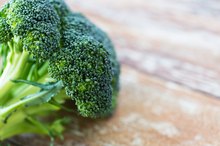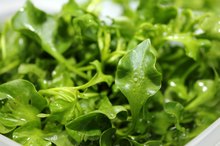What does fact checked mean?
At Healthfully, we strive to deliver objective content that is accurate and up-to-date. Our team periodically reviews articles in order to ensure content quality. The sources cited below consist of evidence from peer-reviewed journals, prominent medical organizations, academic associations, and government data.
The information contained on this site is for informational purposes only, and should not be used as a substitute for the advice of a professional health care provider. Please check with the appropriate physician regarding health questions and concerns. Although we strive to deliver accurate and up-to-date information, no guarantee to that effect is made.
Does Sauerkraut Have Vitamin K?
The names for sauerkraut and vitamin K both originated from the German language. Sauerkraut means “sour cabbage” and vitamin K came from the German word “koagulation” because it plays such an important role in blood clotting. Sharing the same linguistic origin seems appropriate because sauerkraut is a source of vitamin K.
Sauerkraut Basics
Sauerkraut is made from cabbage that has been thinly sliced and allowed to ferment. Lactic acid forms as sugars in the cabbage ferment, giving sauerkraut its distinctive tangy flavor. Sauerkraut can be made at home by shredding or slicing cabbage, putting it into a glass container or stone crock and mixing about 3 tbsp. of salt in with each 5 lb. of cabbage, according to North Dakota State University 1. Pack the cabbage and salt mixture firmly into the container until the salt pulls juices from the cabbage. Use a plate on top to weigh down the cabbage and keep it under the fluid brine. Cover the container and let it sit at room temperature for three to six weeks.
- Sauerkraut is made from cabbage that has been thinly sliced and allowed to ferment.
- Use a plate on top to weigh down the cabbage and keep it under the fluid brine.
About Vitamin K
How to Blanch Broccoli
Learn More
One of only four fat-soluble vitamins, vitamin K occurs in several different forms and plays critical roles in the body. When blood clots, it goes through a series of steps, seven of which depend on the presence of vitamin K, according to the Linus Pauling Institute 2. Vitamin K is also essential for cellular functions and is needed for two proteins that regulate calcium; one that stimulates bone mineralization and another that prevents calcium from accumulating in arteries. The body does not store large quantities of vitamin K, so you need to obtain it on a regular basis through your diet. The recommended daily adequate intake for vitamin K is 90 to 130 mcg per day.
- One of only four fat-soluble vitamins, vitamin K occurs in several different forms and plays critical roles in the body.
- When blood clots, it goes through a series of steps, seven of which depend on the presence of vitamin K, according to the Linus Pauling Institute 2.
Vitamin K in Sauerkraut
One cup of drained sauerkraut provides 18.5 mcg of vitamin K. This represents 23 percent of the total recommended daily value based on a 2,000 calorie-a-day diet. One cup of sauerkraut eaten without draining the extra fluid has 135 mcg.
Other Health Benefits
Cabbage Allergy
Learn More
Sauerkraut is a good source of antioxidants. One cup delivers 35 percent of the daily value of vitamin C, 12 percent of iron and 11 percent of manganese. Vitamin C is a powerful antioxidant that’s also needed for collagen, blood vessels and neurotransmitters. In addition to its role carrying oxygen in the blood, iron functions as an antioxidant protecting cells from the accumulation of hydrogen peroxide. Manganese is a trace element that serves as the principal antioxidant enzyme in the mitochondria, contributes to the formation of collagen and is used in the metabolism of carbohydrates, proteins and cholesterol.
- Sauerkraut is a good source of antioxidants.
- Vitamin C is a powerful antioxidant that’s also needed for collagen, blood vessels and neurotransmitters.
Related Articles
References
- North Dakota State University: Sauerkraut: From Garden to Table; Juli Garden-Robinson, Ph.D., L.R.D., et al; June 2011
- Linus Pauling Institute; Vitamin K; Victoria Drake, Ph.D.; May 2008
- USDA Nutrient Data Laboratory: Sauerkraut -- NDB 11439
- Cabbage, raw. FoodData Central. U.S. Department of Agriculture. Published April 1, 2019.
- NWAC diabetes self-management toolkit for Aboriginal women - fact sheet: Glycemic index. Native Women's Association of Canada. Updated 2012.
- Corliss J. Folic acid, a B vitamin, lowers stroke risk in people with high blood pressure. Harvard Health Publishing, Harvard Medical School. Updated 2015.
- Moore M. 4 types of foods to support memory. Academy of Nutrition and Dietetics. Updated 2020.
- Nosrati N, Bakovic M, Paliyath G. Molecular mechanisms and pathways as targets for cancer prevention and progression with dietary compounds. International Journal of Molecular Sciences. 2017;18(10):2050. doi:10.3390/ijms18102050
- Vitamin A fact sheets for health professionals. National Institutes of Health. Office of Dietary Supplements. Updated 2020.
- The top 10 worst foods if you have diabetes. Cleveland Clinic. Updated 2020.
- Oral allergy syndrome (OAS) or pollen fruit syndrome (PFS). American Academy of Allergy, Asthma & Immunology. Updated 2020.
- Violi F, Lip GY, Pignatelli P, Pastori D. Interaction between dietary vitamin K intake and anticoagulation by vitamin K antagonists: Is it really true?: A systematic review. Medicine (Baltimore). 2016;95(10):e2895. doi:10.1097/MD.0000000000002895
- Cabbage. University of Illinois Extension, Watch Your Garden Grow. Updated 2020.
- Cabbage. University of Maryland Extension. Updated 2020.
Writer Bio
Sandi Busch received a Bachelor of Arts in psychology, then pursued training in nursing and nutrition. She taught families to plan and prepare special diets, worked as a therapeutic support specialist, and now writes about her favorite topics – nutrition, food, families and parenting – for hospitals and trade magazines.









